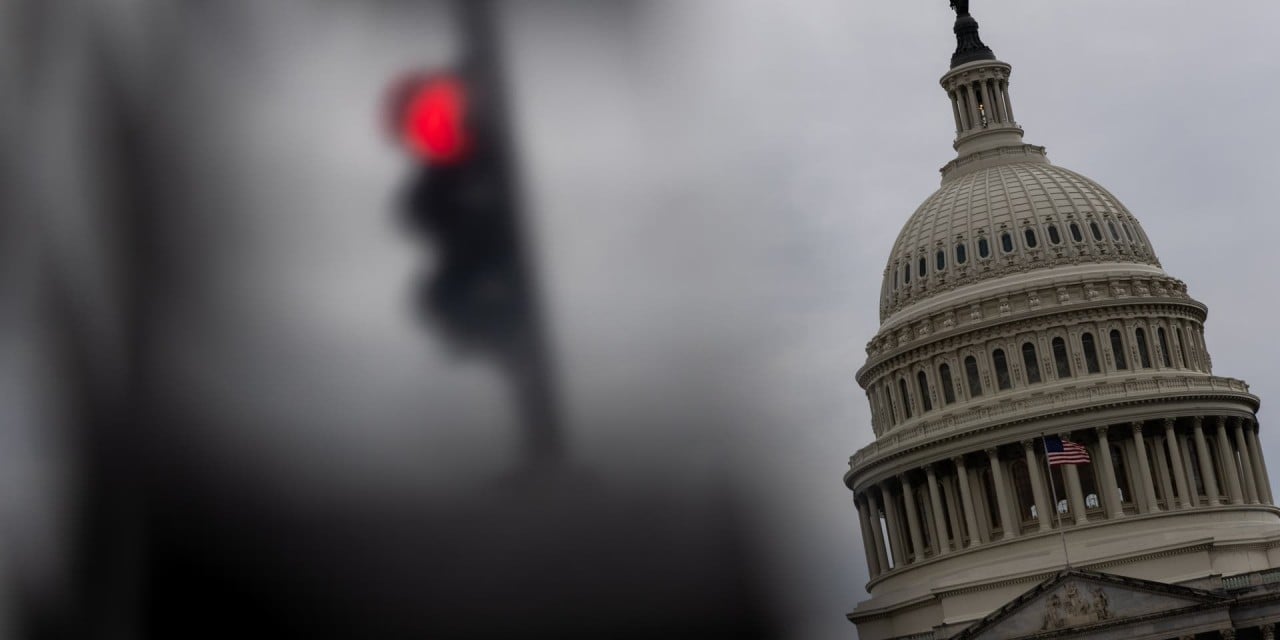 |
| Failing to pass the House of Representatives, Chairman McCarthy's final plan failed, and the US government was almost certain to shut down. (Source: Getty Images) |
This move makes the possibility of a partial US government shutdown, starting October 1, almost certain to happen.
With 232 votes against and 198 votes in favor, the US House of Representatives rejected a bill proposed by US House Speaker Kevin McCarthy, which would have cut spending and restricted immigration in order to extend the government's budget for another 30 days, helping federal agencies avoid the scenario of having to shut down at the start of the new fiscal year (from October 1, 2023 to September 30, 2024).
The chances of a bill on this issue passing the Senate are also very slim.
The move came just one day before the deadline for the two houses of the US Congress to agree on a budget for fiscal year 2024 at 00:01 on October 1 local time (11:01 Vietnam time), bringing the US government closer to the possibility of a shutdown, leading to the risk of more than 4 million federal employees not being paid and all government activities from financial supervision to scientific research being hindered.
Speaking to reporters after the vote, House Speaker McCarthy said the vote was not over and he still had other ideas. The House is expected to hold more votes on September 30.
Meanwhile, the Senate is expected to vote on the afternoon of September 30 on a bipartisan bill that would extend government spending until November 17, while increasing aid to Ukraine and spending on disaster relief in the US.
Many US officials have warned of the consequences of a government shutdown. In a speech on September 29 in Savannah, Georgia, US Treasury Secretary Janet Yellen said that a government shutdown could impact the country's economic progress due to the loss of important programs for small businesses and children, as well as delays in upgrading infrastructure.
She said House Republicans needed to act to keep the government running and comply with the budget deal agreed upon at the end of May. "Irresponsible actions by House Republicans will hurt American families and create headwinds for the economy that could undermine the progress we have made," the Treasury Secretary said.
Every aspect of government activity would be affected, from loans to farmers and small businesses to food and worker safety inspections to child care programs. And the shutdown risks delaying major infrastructure upgrades.
Earlier in the day, White House economic adviser Lael Brainard warned that the risk of a government shutdown this weekend was an “undue risk” for a resilient economy with moderate inflation.
Speaking on CNBC , Ms. Brainard cited data from the US Department of Commerce that in August, the country's annual core inflation, excluding food and energy, fell below 4% for the first time in more than two years. According to her, this is "good news" for the economy. Therefore, the US government shutdown is "a completely unnecessary risk for an economy that has proven to be resilient."
Last May, President Joe Biden and House Speaker Kevin McCarthy reached a deal to avoid a government shutdown this year, ending a dispute over the federal debt ceiling and setting a budget target of $1.59 trillion for the fiscal year beginning October 1.
However, many Republicans have rejected the deal, demanding a $120 billion cut in this budget. The two houses of the US Congress have not been able to find common ground on measures to prevent a government shutdown, as the House of Representatives pursues spending cuts, while the Senate wants to extend federal spending.
Source



![[Photo] General Secretary To Lam, Secretary of the Central Military Commission attends the 12th Party Congress of the Army](https://vphoto.vietnam.vn/thumb/1200x675/vietnam/resource/IMAGE/2025/9/30/9b63aaa37ddb472ead84e3870a8ae825)
![[Photo] Solemn opening of the 12th Military Party Congress for the 2025-2030 term](https://vphoto.vietnam.vn/thumb/1200x675/vietnam/resource/IMAGE/2025/9/30/2cd383b3130d41a1a4b5ace0d5eb989d)
![[Photo] The 1st Congress of Phu Tho Provincial Party Committee, term 2025-2030](https://vphoto.vietnam.vn/thumb/1200x675/vietnam/resource/IMAGE/2025/9/30/1507da06216649bba8a1ce6251816820)
![[Photo] President Luong Cuong receives President of the Cuban National Assembly Esteban Lazo Hernandez](https://vphoto.vietnam.vn/thumb/1200x675/vietnam/resource/IMAGE/2025/9/30/4d38932911c24f6ea1936252bd5427fa)
![[Photo] Panorama of the cable-stayed bridge, the final bottleneck of the Ben Luc-Long Thanh expressway](https://vphoto.vietnam.vn/thumb/1200x675/vietnam/resource/IMAGE/2025/9/30/391fdf21025541d6b2f092e49a17243f)


































































































Comment (0)